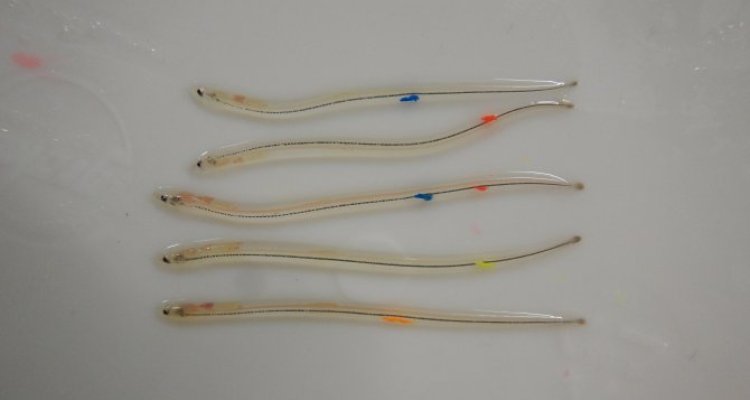
News
Annual report animal testing 2022: increase due to monitoring fish stock
Wageningen University & Research (WUR) conducted a total of 104.891 tests involving animals in 2022. Although WUR works hard to reduce the number of tests on animals, there was an increase of 29% compared to 2021. This increase is largely due to research aimed at protecting animals, such as monitoring fish stock. Additionally, there is a small increase due to research in the field of animal nutrition and research in infectious diseases in the interest of human and animal health.
WUR performed most of its animal tests (80%) on fish. This research is commissioned by ministries, water authorities and provinces. They wish to regulate the protection of vulnerable fish populations such as the elver (young eels). The tiny elver are anaesthetised and tagged with a needle, after which they are returned to the water. Catching fish in different locations later allows researchers to determine to what extent the elver are hindered by obstacles such as water locks and dams on their way to the spawning area. Catching, anaesthetising and handling causes the fish discomfort, which makes these interventions animal tests according to legal definitions.
Almost 13% of the animal tests at WUR were conducted on chickens (‘domestic fowl’). The largest part of this research was aimed at animal welfare and animal nutrition. Additionally, research was done in the context of avian influenza, which was present year-round in 2022.
The WUR annual report on Animal Testing 2022 presents all the data with clarifications. The data are categorised according to types of animals, types of research, and degree of discomfort suffered by the animals. Because a single animal can be involved in multiple studies, the number of animals used is always smaller than the number of tests performed on animals.
Future perspective
The animals that were used in tests contribute to learning how we humans can live in harmony with our environment. At WUR, we discuss how we want to work with animals in our research and education. We will continue this conversation, not just within our organisation but also with society at large, for example, through dialogues with animal protection groups.
Animal welfare is a priority in all WUR’s education and research. We actively promote the so-called 3 Rs (replace, reduce, refine), which means that researchers must always ask themselves if the results can be achieved without the use of animals (replace) or with fewer animals (reduce) and how the discomfort suffered can be reduced and well-being improved (refine). WUR invests 12 million euros in a programme for innovative new research methods and techniques for animal sciences such as sensors, smart data/computer models and cultivating animal tissue (organoids). These methods and techniques are expected to enable our researchers to advance in understanding and monitoring the health, resilience and well-being of animals (and humans) in the coming decades.